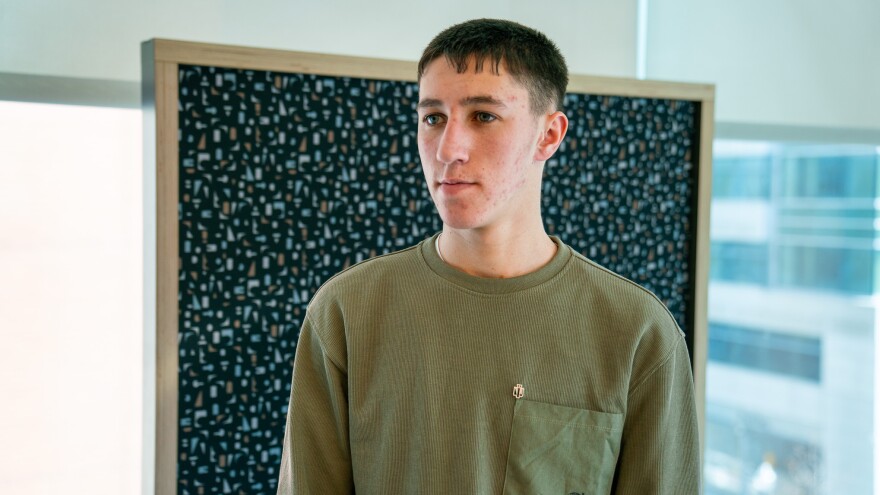When Rostislav Lavrov failed to sing the Russian national anthem, he was punished.
At the age of 16, the boy had been taken from his home in the Kherson region of Ukraine. The Russian military told him he had to go to summer camp for two weeks of "rest and recreation." The camp kept him for longer, and it had rules.
For not singing along, Lavrov said he was kept in a six-foot-square cell for days at a time.
"There's a small wardrobe. There's a toilet. You're not allowed to use the phone. You're not allowed to go anywhere," he told NPR's Morning Edition through an interpreter.
After nearly a year, he made it out of Russian-controlled territory with the help of the charity Save Ukraine.
Lavrov, now 18, is one of more than 19,000 minors whom Russia has taken, according to Ukraine's National Information Bureau. He and other young Ukrainians testified on Capitol Hill last week, accompanied by Save Ukraine CEO Mykola Kuleba.
Kuleba told NPR he brought the stories of abducted children to the U.S. Helsinki Commission to emphasize the need for ongoing American aid.
"We need everything," he said. "We need [to] rescue more children. We need [to] provide recovery for these kids, housing, food, health. These kids received traumas. And we have to help."
According to Kuleba, Save Ukraine has rescued 232 children. The nongovernmental organization counts the United Nations and USAID among its funders. It runs rehabilitation centers for children displaced by war, providing education, housing, and psychological support.
"It's very expensive, and our child welfare system collapsed because of war," Kuleba said.

Nearly two years ago, when the invasion started, Lavrov's grandmother died of a heart attack, Lavrov said. Then Russian soldiers took his mother to a medical facility, but he was not told where it was. Months later, they came for him.
In Russian-occupied Crimea, authorities tried to erase his past. They replaced his Ukrainian birth certificate with a Russian one. But he never gave up on getting home. A friend's mom and the charity Save Ukraine helped him. He made it back to Ukraine one year after he was taken.
Asked what he wants now, Lavrov said, "I would want my mother to come back to Ukraine and be healthy."
He's still waiting for news of her.
Ksenia's story
Ksenia Koldin and her little brother were living in a foster home in Vovchans'k, Kharkiv, when Russia invaded. She was 17, in her last year of school before university. In her testimony to Congress, she described hiding in a cellar from the constant shelling.
In the summer of 2022, the Russian military separated Koldin from her brother, who had just turned 11, and took them to Russia. She was taken to a technical school in Shebekino, a town in Belgorod Oblast. Her brother was taken to a summer camp. Like Lavrov, the stated reason was "rest and recreation."
"It was a scheme of taking Ukrainian kids, under the pretense of taking them to a summer camp while the war is going on," Koldin told NPR through an interpreter. "But as it turns out, it was a scheme of kidnapping kids."
They were separated by 900 miles, Koldin said, and it would be nine months before they reunited.
"I must say these were the worst nine months of my life," she said.

At the school, they tried to make her take Russian citizenship. She refused.
"We were brainwashed into saying that, if Russia wouldn't have invaded, then Ukraine would have invaded first," Koldin said. "I would just sit thinking to myself, glory to Ukraine. My country is going to prevail and win. You can say whatever."
Her brother was placed with a Russian family, who tried to cut off communication between the siblings. According to Koldin, her brother's foster mother would tell him that there was no future for Ukraine and that it was run by Nazis. After Koldin was rescued by Save Ukraine, it took her several hours to convince her brother to return to Ukraine with her.
"I would tell him he's the only person, really, of my relatives," she said. "I would not promise him anything about what was going to be in Ukraine. But I would tell him that if we're going to be together, it would be all right."
Ksenia Koldin got her wish. She and her younger brother reunited and returned to Ukraine.

Counting the taken
The Ukrainian officials who gave testimony to the U.S. Helsinki Commission said more than 19,000 children have been taken into Russian-controlled territory or into Russia itself. They believe that is an undercount.
"Until we liberate all Ukraine, until we win this war, we will not know how many of our children, of our civilians, have been abducted or killed," said Oksana Markarova, ambassador of Ukraine to the United States.
Andriy Kostin, prosecutor general of Ukraine, gave remarks to the commission via recorded video. He said the displacement of Ukrainian children dates to Russia's 2014 annexation of Crimea, and he alleged the practice amounts to crimes against humanity.
"We are talking about the next generation of Ukrainians. We are talking about the fate of each and every child, some being as young as one year old, who will grow up not knowing who they are," Kostin said.
He pointed to legislation that speeds up the process of getting Russian citizenship for orphaned Ukrainian children. He said Russia takes children to deny their Ukrainian identity.
Anton Loboda interpreted, Reena Advani edited, and Taylor Haney produced the audio story. Majd Al-Waheidi edited the digital story.
Copyright 2024 NPR. To see more, visit https://www.npr.org.





